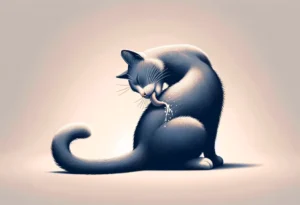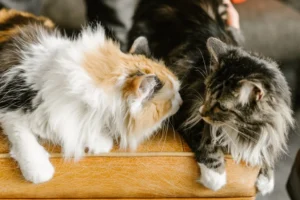Cats: known for their fastidious grooming habits, seem to constantly clean themselves. Why is this behavior so ingrained in our feline friends? Let’s find out.
Cats groom themselves constantly due to their natural instincts and several benefits it provides them, including temperature regulation, scent marking, and grooming for social bonding purposes. Let’s take a closer look at why cats are always cleaning themselves.
Instinctual Behavior
Cats are natural-born groomers, and this behavior can be traced back to their wild ancestors. Wild cats would groom themselves to remove any scents that could alert predators to their presence or to eliminate any potential parasites that could harm them. This instinctual behavior has been passed down through generations, ingrained in our domestic feline friends.
Temperature Regulation
Grooming plays a crucial role in helping cats regulate their body temperature. When cats lick their fur, it causes evaporation, which helps cool them down, especially in hot weather or after physical activity. Additionally, by removing dirt and debris from their fur, cats can also prevent matting, allowing for better airflow to their skin.
Other benefits of cats’ constant grooming include promoting blood circulation, distributing natural oils for a healthy coat, and providing a sense of comfort and relaxation. So next time you catch your feline friend meticulously grooming themselves, know that it’s not just for cleanliness—it’s a vital part of their overall well-being.
Scent Marking
Cats are like little perfumers, constantly grooming themselves to spread their unique scent around. This not only helps them feel fresh but also serves a greater purpose in their world. Scent marking is a crucial part of a cat’s communication, helping them establish territory and communicate with other felines without saying a word. So, next time you catch your cat in a grooming session, remember they’re not just cleaning; they’re leaving their mark for the world to smell.
Social Bonding
Ever wondered why cats spend so much time grooming each other? Well, it’s not just about keeping those fur coats in top shape. Social bonding among cats is a significant reason why they constantly groom each other. It strengthens relationships within the group, creating a sense of unity and trust. So, when your feline friends are engaging in a mutual grooming session, they’re not just sharing hairballs; they’re solidifying their bond in a subtle and sophisticated way.
Bonus Insight: Cats who groom each other are not just spreading scent and building bonds. This mutual grooming also helps in establishing a hierarchy within a group of cats. The cat being groomed shows submission, while the grooming cat asserts dominance—a hierarchy in action, one lick at a time.
Hairball Prevention
Grooming isn’t just a vanity project for cats – it’s actually a crucial part of their health routine. By constantly cleaning themselves, cats are not only keeping their fur looking fabulous but also preventing pesky hairballs from forming in their stomachs. When cats groom themselves, they remove loose fur and dirt from their coat, which helps prevent them from ingesting too much hair during their daily grooming sessions. This proactive approach to grooming reduces the likelihood of hairballs forming, saving your feline friend from discomfort and potentially costly vet visits.
Tip : To further help your cat prevent hairballs, consider incorporating a specialized hairball control diet into their feeding routine. These diets are formulated to minimize hairball formation and promote digestive health in your furry friend.
Stress Relief
Ever notice how your cat seems to transform into a zen master when they’re in the middle of a grooming session? That’s because grooming serves as a powerful stress reliever for our feline companions. When cats groom themselves, they release endorphins that help them feel relaxed and content. This self-soothing behavior not only keeps their coat in pristine condition but also provides them with a sense of comfort and security in their environment. So next time you catch your cat engaged in a grooming session, know that they’re not just cleaning themselves – they’re also finding peace of mind in the process.
Remember, grooming plays a crucial role in your cat’s physical and emotional well-being, so encourage this behavior by providing them with plenty of opportunities to groom themselves. Through grooming, your cat not only keeps themselves looking sharp but also maintains a healthy mind and body.
Dental Health
Grooming is not just about looking good; it’s also crucial for a cat’s dental health. By constantly licking themselves, cats help remove plaque and food particles from their teeth, preventing dental issues like gum disease and cavities. This self-cleaning behavior is Nature’s way of ensuring cats have healthy teeth and gums throughout their lives.
Parasite Prevention
Grooming serves as a natural defense mechanism for cats against pesky parasites like fleas and ticks. When cats lick themselves, they not only keep their fur clean but also make it harder for parasites to make a home on their bodies. Additionally, the abrasive texture of a cat’s tongue can remove some parasites before they have a chance to latch on. So, next time you see your cat grooming, remember they’re not just being vain – they’re also keeping those nasty critters away!
Additional Insight: Diet Connection
A lesser-known benefit of a cat’s grooming behavior is its link to diet. Cats that groom excessively or inadequately might be showing signs of nutritional deficiencies, so it’s essential to ensure your furry friend’s diet is balanced and provides all the necessary nutrients for healthy grooming habits. If you notice any changes in your cat’s grooming behavior, it’s always a good idea to consult with your veterinarian to rule out any underlying health issues.
Interesting Fact:
Did you know that cats spend up to 50% of their waking hours grooming themselves? This fun fact will provide readers with a fascinating insight into a cat’s grooming habits.
Cats are meticulous groomers, and there are some paw-sitively good reasons behind this behavior. One key reason is that grooming helps them regulate their body temperature. By licking their fur, they spread saliva which evaporates and cools them down when the weather gets too hot.
Another important reason is that grooming helps cats maintain good hygiene. They are naturally clean animals and grooming helps them keep their coat free of dirt, parasites, and other unwanted things that could bother them.
Furthermore, grooming serves a social purpose for cats. When two cats groom each other, it strengthens their bond, showing trust and affection. This behavior is often seen in cats that share a close relationship, such as littermates or a mother cat and her kittens.
In addition to these reasons, grooming also helps cats relax and relieve stress. Just like how a soothing bath can relax us humans, grooming provides cats with a calming experience that helps them feel content and secure in their environment.
Next time you see your cat cleaning themselves, remember that they’re not just being finicky – they’re simply taking care of themselves in the best way they know how.
Additional Insight:
Cats have tiny, hook-like structures on their tongue called papillae that help them clean efficiently. These barbs on their tongue are pointing backward, allowing them to remove loose fur and dirt easily as they groom. This unique adaptation makes cats grooming masters!
Alex, a passionate animal lover, has experience in training and understanding animal behavior. As a proud pet parent to two dogs and three cats, he founded AnimalReport.net to share insights from animal experts and expand his knowledge of the animal kingdom.









